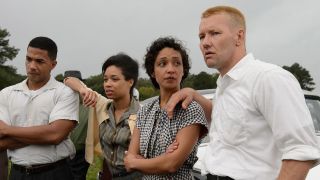Since his big screen debut in 2007, writer/director Jeff Nichols has achieved a rare 100% hit rate. This hasn’t changed with his latest – Loving – a stoically understated but often deeply moving historical biopic about an interracial couple swept up in a sea-change moment for civil rights in the United States. At least, that’s the Big Picture issue. More accurately, Loving is a tale of unconditional commitment between a couple profoundly in love.
The lives of Mildred (Ruth Negga) and Richard Loving (Joel Edgerton) are, in many ways, nothing special. They watch drag races, listen to rock ’n’ roll and drink moonshine out of jars. They’re also expecting a child, which prompts the pair to marry despite the barbaric anti-miscegenation laws, forbidding legal union between interracial couples, still enforced in 1958 Virginia. One night the police burst into their bedroom and haul the pair off to jail in a terrifying display of intolerance. After posting bail, a judge presents them with an ultimatum: dissolve the marriage or leave the state and never return together. With no choice the pair move to DC, but the green fields of Virginia will always be their home and they resolve to one day return.
Hot on the heels of Midnight Special’s sci-fi strangeness, Loving is Nichols’ most heartfelt movie to date. As a true life tale it’s something of a departure for the writer/director, but he proves no less adept at playing it straight. There’s a much more traditional courtroom drama to be made out of the Loving's story, but Nichols takes his tale down a different path, rarely submitting to cliché or expectation. Unusually, the central pair are somewhat passive in their own story. Mildred contacts the office of Robert Kennedy, who's on the Civil Rights campaign trail, for help which gets the ball rolling, but after that their historic case is almost entirely driven by the ACLU and in-over-his-head lawyer Bernie Cohen (Nick Kroll, The Douche from Parks And Rec minus the soundboard). It’s a choice that flies in the face of received wisdom, creating a sense of remoteness which robs the film of some emotional wallop, but it’s faithful to the real history and keeps the focus squarely on the Lovings, even as their case becomes national news.

It’s elegantly shot, and Nichols knows how to keep his audience captivated, even in the likely event they know the outcome of the story. With the threat of jail hanging over them if they’re caught together in Virginia, a suffocating tension descends, moments of blessed relief few and far between. As one friend bluntly states, they could put an end to this pervading aura of fear by simply getting a divorce. But the option is never considered, let alone discussed. Even in a backwards world of racial segregation, Richard and Mildred never lose sight of their love for each other.
Ruth Negga gives the standout performance as Mildred. Like the film as a whole, she’s reserved and quietly human in her understatement, Negga wearing the pain of her family’s horrifying predicament entirely on her bone-tired face rather than resorting to grandstanding speeches or shouty hysterics. She’s an early frontrunner for major awards glory, even if the film, unsentimental as it is, is unlikely to make a major splash with the Academy. Mildred is the more emotionally open of the two, which is more a comment on how closed off Richard is. Edgerton’s mumbly, near-monosyllabic performance is difficult to warm to, and can make his character feel a little one note, but there’s a stoic pride and a frustrated fury to his desperate desire to simply take care of his wife. Again, he never flies off the handle or breaks down, Loving is not that film.
Nichols regular Michael Shannon also turns up, of course, in an extended cameo as a Life Magazine photographer after the case makes headlines. His presence proves more of a distraction than such a small role should, eliciting a chorus of chuckles around the Palais. But he is integral to one of the film’s most profoundly moving scenes, as Mildred and Richard share a beautifully mundane moment in front of the TV, the pair laughing while Richard lies with his head in Mildred’s lap – a pure, heart-wrenching distillation of screen love.


